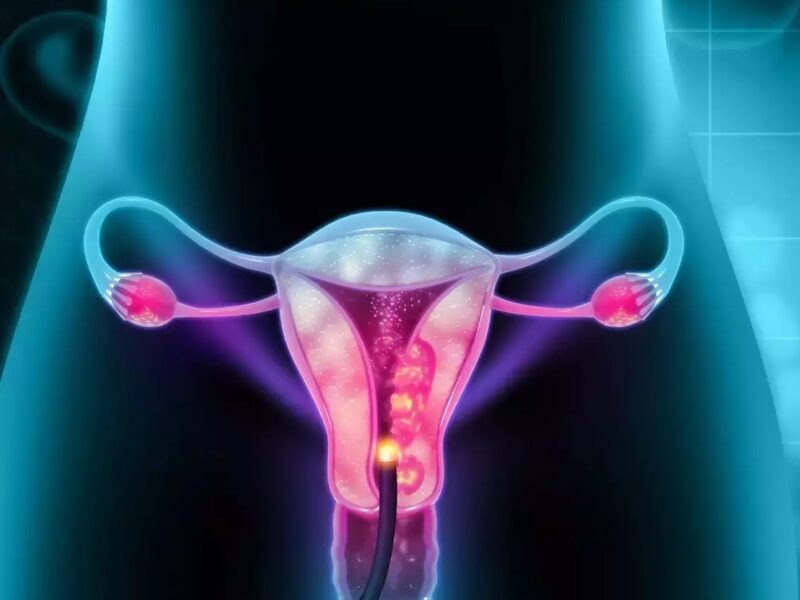Many women experience anxiety when they miss a period, particularly if they are sexually active. This could be due to several reasons, including pregnancy, stress, hormonal changes, illness, or certain medications.
But is it possible that a missed period might indicate cervical cancer? This cancer type impacts the cervix’s cells, located at the uterus’s lower end, connecting to the vagina.
Typically, cervical cancer arises from a long-standing infection with specific human papillomavirus (HPV) strains, a widespread sexually transmitted infection. Symptoms of cervical cancer can include unusual vaginal bleeding, discharge, or pain.
However, early-stage cervical cancer often presents no symptoms. In this article, we’ll look into whether there’s a connection between missing a period and the potential for cervical cancer, providing essential information.
Additionally, we’ll cover cervical cancer prevention strategies and steps to take if you’re concerned about your health.
How Common Is It?
A missed period is not a very common sign of cervical cancer. According to a study by the American Cancer Society, only 4% of women with cervical cancer reported a missed period as their first symptom.
Most women with cervical cancer had other symptoms, such as abnormal bleeding, discharge, or pain. A missed period is more likely to be caused by other factors, such as pregnancy, stress, hormonal imbalance, illness, or medication.
However, if you have a missed period along with other symptoms of cervical cancer, such as abnormal bleeding, discharge, or pain, you should see a doctor as soon as possible.
Cervical cancer can affect your menstrual cycle in different ways, depending on the stage and extent of the disease. These are some of the possible effects.
Irregular periods
Hormonal shifts triggered by cervical cancer can disrupt your menstrual cycle’s regularity, causing irregular periods. You might experience shorter or longer cycles than normal, or they might happen with greater or lesser frequency.
Spotting or bleeding may occur between your regular periods or following sexual activity.
Heavy periods
Cervical cancer can lead to the formation of fragile blood vessels in the cervix, prone to bleeding. This often results in more intense menstrual bleeding or extended duration of periods.
Clots or tissue presence in your menstrual flow is also a possibility.
Missed periods
Inflammation or blockage in the cervix due to cervical cancer can obstruct menstrual blood flow, potentially leading to missed periods or extremely light or non-existent cycles.
Other symptoms might include pelvic or back pain, or challenges in urination or bowel movements.
How to Prevent?
The best way to prevent cervical cancer is to get vaccinated against HPV, have regular screening tests, and go back to the doctor if your screening test results are not normal.
HPV Vaccine
The HPV vaccine is effective against HPV types that commonly cause cancers of the cervix, vagina, and vulva. It’s advised for preteens at 11 to 12 years but can start as early as 9. The vaccine is also recommended up to age 26 for those not previously vaccinated.
It prevents new HPV infections but doesn’t treat existing ones, making early vaccination, before HPV exposure, most effective.
Cervical Cancer Screening
Screening tests are crucial for detecting changes that could lead to precancer or cervical cancer. The Pap test identifies potential precancers by examining cervical cell changes.
The HPV test detects the virus responsible for these changes. Both are available in medical offices or clinics. For those with low income or without insurance, the CDC’s National Breast and Cervical Cancer Early Detection Program offers free or low-cost screenings.
| Age | Screening test | Frequency |
|---|---|---|
| 21-29 years | Pap test | Every 3 years |
| 30-65 years | Pap test and HPV test (co-testing) | Every 5 years |
| 30-65 years | HPV test alone | Every 5 years |
| 30-65 years | Pap test alone | Every 3 years |
| Over 65 years | No screening | If you have a history of normal screening results and are not at high risk of cervical cancer |
Follow-up
If your screening test results are not normal, you may need further tests or treatment. Depending on the type and extent of the abnormal cells, you may need a colposcopy, a biopsy, or a procedure to remove or destroy the abnormal cells.
It is important to follow your doctor’s recommendations and complete the follow-up care.
